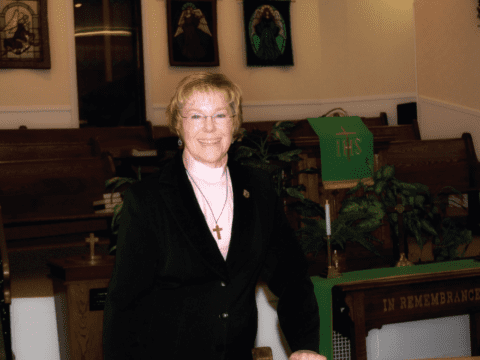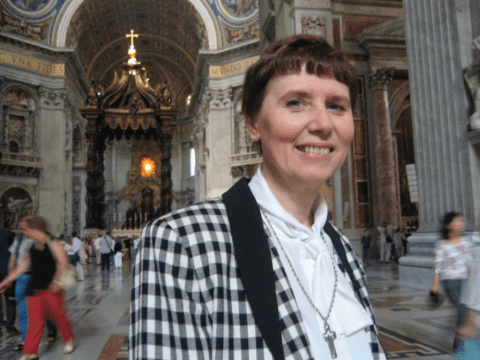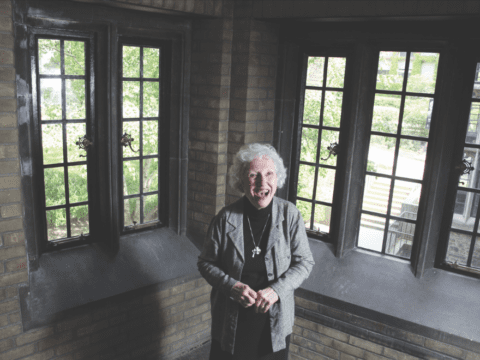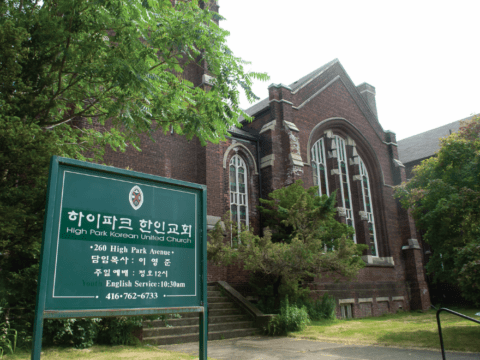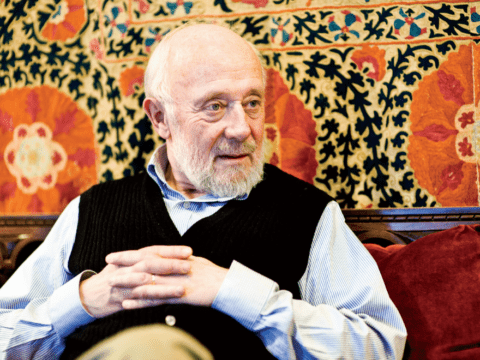“We affirm a hope that a new day is dawning upon us,” prayed former moderator Very Rev. Robert Smith in 2003 after commissioners to the 38th General Council in Wolfville, N.S., had enthusiastically approved a document called Bearing Faithful Witness. Years in the making, the study affirmed the unique relationship between Christianity and Judaism and acknowledged a history of anti-Judaism and anti-Semitism within Christian theology and the United Church.
Six and a half years later, however, that hoped-for new day was looking an awful lot like the old days of fracture between the United Church and the Jewish community. In late January, Bernie Farber, CEO of the Canadian Jewish Congress (CJC), told the National Post that the United Church and the CJC had reached a “breaking point” in their relationship. If a meeting between the heads of the organizations could not resolve their differences, “there is the possibility that this could lead to a schism.”
What brought the United Church and the CJC to the brink? The key issue, says Farber, was a question of “who was a partner with whom?” The CJC, Canada’s largest Jewish organization, was concerned about the church’s ties to a Jewish activist association that supports an academic, cultural and economic boycott of Israel to pressure it to change its policies on Palestine. Farber describes Independent Jewish Voices as a “small, radical rump group” and dismisses its views as “completely antithetical to the mainstream of Canadian Jewry.” IJV spokesperson Sid Shniad of Vancouver counters that “it’s no business whatsoever of the Canadian Jewish Congress who the United Church works with at any level.”
The story of how the church ended up at the centre of this feud between the two groups goes back to last summer’s General Council in Kelowna, B.C. Proposals that called for boycott, divestment and sanctions against Israel angered the CJC and other Jewish organizations and dominated media coverage of the event. Both the CJC and IJV had a presence at Kelowna: one of the CJC representatives spoke against the proposals, while the IJV ran an information table supporting them. In the end, the proposals were withdrawn, but commissioners left the door open for local levels of the church to include economic boycott among measures they might consider as they debate strategies for peace in the Middle East.
The uproar did not end with General Council. In September, the National Post reported that the United Church had made a $900 grant to offset travel expenses to a March 2008 conference where IJV was founded. Farber called the grant “shocking, outrageous, shameful and scandalous.” The church admitted“greater scrutiny” might have been warranted and pledged to review its approval mechanisms. Says Rev. Bruce Gregersen, the United Church’s chief program officer, “It would be inappropriate for us to fund the formation of . . . any organization within a faith community external to The United Church of Canada.”
A month or so later, the CJC learned that IJV and the justice, global and ecumenical relations committee of Montreal Presbytery were co-sponsoring a lecture by Marc Ellis, a Jewish-American professor whose new book, Judaism Does Not Equal Israel: The Rebirth of the Jewish Prophetic, advocates a controversial one-state solution to the Middle East conflict. This news “was sort of the straw that broke the camel’s back,” says Farber.
December brought a new wrinkle when Immigration Minister Jason Kenney, speaking at an international conference in Jerusalem, linked the defunding of the ecumenical global justice group KAIROS to the government’s “zero tolerance approach to anti-Semitism,” alleging that the United Church-supported organization played a “leadership role” in the international Israel boycott campaign. KAIROS, which had never advocated an Israel boycott, strongly objected to the anti-Semitism claim, and Gregersen criticized it as a “horrible charge,” saying it “cheapens the reality of anti-Semitism in the world and diminishes the very careful attention that it deserves.” The CJC did not comment on the incident, but IJV issued a press release denouncing Kenney’s accusation.
Tensions were running high before the church and the Congress finally arranged to talk. In a Twitter post in mid-January, Farber linked to a speech on the IJV website by Jewish-Israeli peace activist Nurit Peled-Elhanan that invokes anti-Semitic tropes in its condemnation of Israeli violence. (“Our children have learned that to kill a non-Jew, of whatever age, is a great commandment,” Peled-Elhanan asserts.)
Tweeted Farber, “And the United Church still makes common cause with them. Go figure.” A week later, Gregersen told the Canadian Jewish News that “IJV is not an organization that we [the national church] choose to partner with for any future activity.” The United Church and the Congress also set a date to meet and try to mend their frayed relationship.
The rift forms a new chapter in the long and sometimes stormy history of The United Church of Canada and the Canadian Jewish community. In his essay “The United Church Record,” Prof. Alan T. Davies notes that during the 1930s and ’40s many ministers and church leaders spoke out against anti-Semitism and the Nazi persecution of Jews, but their efforts failed to mobilize a large enough outcry to overcome the government’s resistance to admitting Jewish refugees from Europe.
In the late 1960s, Rev. A.C. Forrest, the editor of The United Church Observer, took up the Palestinian cause. While many in the church and beyond viewed Forrest as a courageous voice for justice, others — including most of the Canadian Jewish community — thought he went too far in his criticism of Israel. Between 1967 and 1974, he published numerous features and editorials on the Middle East, as well as a best-selling book, The Unholy Land. He vigourously denied charges he was anti-Semitic, but his printing in March 1972 of an article by John Nicholls Booth, “How Zionists Manipulate Your News,” provoked B’nai Brith to launch a libel lawsuit that was later settled out of court. Rabbi Reuven Slonim, in his 1977 book Family Quarrel, described the United Church and the Canadian Jewish community as “two opposing camps viewing each other across a Maginot line.”
The chill continued for years after Forrest’s sudden death in 1978 and hadn’t entirely dissipated when Bearing Faithful Witness began taking shape in the 1990s. Rev. Don Koots, chair of the Calgary task group that worked on the paper, says that Jewish leaders “trusted us as individuals” but often perceived the church itself as “pro-Palestinian and quite negative toward the State of Israel.”
The trial of Jim Keegstra, an Alberta high school teacher who used his classroom as a platform for Holocaust denial, triggered the 1988 General Council petition that led to the study. Proclaiming anti-Semitism an affront to the gospel of Jesus Christ, Bearing Faithful Witness rejects theological teachings contemptuous of Jews and Judaism, including super-sessionism, the belief that Christians have supplanted Jews as God’s people. While not focused on the Middle East conflict, it affirms the State of Israel’s “right to exist in peace and security,” recognizing its significance to the Jewish identity.
Bearing Faithful Witness “did do a lot to reestablish a relationship with the Jewish community,” says Rev. Clint Mooney, one of the document’s drafters. However, he adds, “I don’t think we’ve maintained our relationship, or built on [it] since 2003,” when the report was approved.
Despite the friction in advance of the February meeting between the United Church and CJC leadership, Farber reports that the tone was “respectful, even collegial” once the two sides met face to face. In a jointly released statement, the United Church recognized its “long-standing and historical relationship with the Congress” and reiterated that IJV “has not been and is not a partner of The United Church of Canada.” Says general secretary Nora Sanders, “We see [the Congress] as the voice for the majority of the Jewish community of Canada, and it’s important for us to be able to have dialogue and consultation with them.” For over 30 years, the church has worked with the CJC as part of the Canadian Christian-Jewish Consultation, a body that includes the Catholic church and several other Protestant denominations.
In turn, the CJC acknowledged that the church “by its very nature listens to many voices and many perspectives in Canada and beyond on all issues,” including peace in the Middle East. Says Farber, “We understand that [the national office] doesn’t have the authority to tell churches what to do, nor should it,” but he hopes that its position on IJV will be embraced at the local level.
Jason Kenney’s accusations against KAIROS were on the meeting’s agenda, but in the two-hour discussion, “we honestly didn’t get to it,” says Farber. However, both sides committed to ongoing dialogue to tackle difficult issues and find ways to work together. “We put our feelings on the table and held the tensions creatively,” the joint statement says.
And there are certainly a lot of tensions to hold on this issue. While some are pleased to see the United Church and the CJC back on firmer footing, others are disappointed about the top-level distancing from IJV. “I lament that a meeting was not held with IJV before that decision was made, and that we too easily, in my opinion, gave in to the pressure” from the CJC, says Rev. Brian McIntosh, a member of the Toronto Conference’s Holy Land task group, which has worked with IJV since its inception. He feels IJV has been “unfairly maligned” for speaking out about Israel.
Mooney, however, thinks it’s important to understand the vastly different weight of the two organizations within the Jewish community. He doesn’t blame the CJC “for wondering if we’re really their friends or not” and hopes the recent truce might offer the CJC and the United Church “an opportunity to actually get talking again” as regular dialogue partners.
But others worry about limiting the church’s conversations with the Jewish community to only one organizational voice. Rev. Faye Wakeling, chairperson of Montreal Presbytery’s justice, global and ecumenical relations committee, says that justice work in the United Church in Quebec is traditionally carried out through informal coalitions with various groups “that bring us together on common ground.” The church “doesn’t have to have a formal partnership” with IJV, says Wakeling, “but I think as an alternative voice, and as a voice of people who have great commitment. . . to their journey as Jewish people to find peace in the Middle East, that we need to be talking with them.” The United Church began to distance itself in earnest from IJV after media reports linked the group’s co-founder and former co-chair Diana Ralph to 9-11 conspiracy theories.
A September column by Jonathan Kay in the National Post accused Ralph of implicating right-wing Israelis in the 9-11 attacks, citing an article she contributed to the book The Hidden History of 9-11. Ralph rejects these “malicious allegations,” stating, “I have never accused Israelis (or ‘Jews’) of having anything directly to do with the 9-11 attacks.” Her 2006 article, “Islamophobia and the ‘War on Terror’: The Continuing Pretext for Imperial Conquest,” does claim, however, that “it is difficult to draw another conclusion than that Bush’s associates organized the 9-11 attacks to kickstart popular support for [the] war.”
Nora Sanders admits to being concerned “when we learned of voices within Independent Jewish Voices that expressed views more extreme than I would want the national church associated with.” Gregersen says the suggestion that the U.S. government had anything to do with the attacks “simply is beyond what we would even consider as a church.” Independent Jewish Voices, for its part, takes no position on 9-11 and “considers it irrelevant to its mandate.”
More to the point, in the group’s opinion, is where it stands on the Middle East situation. Indeed, Shniad sees significant harmony between IJV’s views and the views of the United Church. “We’re taking very similar positions to the church on Israel and Palestine,” he says.
So where, exactly, does the United Church stand on Israel and Palestine? For the past three General Councils — 2003, 2006 and 2009 — commissioners have debated and rejected boycott proposals transmitted to them by the church’s lower courts. At the same time, however, the church has expressed a growing concern about human rights in the occupied territories. Most recently in Kelowna, commissioners passed a resolution encouraging Conferences, Presbyteries and congregations to study and take action on ways to end the occupation of Palestinian land, “including, but not limited to economic boycott.”
The church’s core position has a dual focus, says Gregersen: “[We] hold forth a desire and a hope for the safety and security of Israel as a Jewish state” but also believe “that the occupation must come to an end in order for peace to come to the Middle East.” Opposing the occupation means being critical of Israeli policies that continue to expand the settlements, “one of the major blocks to peace,” says Gregersen. And herein, he says, lies “the heart of the tensions” the church faces with the Jewish community: criticism of Israel tends to bring charges of anti-Semitism.
Bearing Faithful Witness attempts to distinguish between legitimate criticism, which focuses on specific government policies, and attacks that demonize Israel and target its Jewish identity. The section was a bit controversial, says Koots, as some Jewish leaders questioned why the church felt compelled to criticize Israel when atrocities in other parts of the world are ignored. But, he observes, “our sense of being Christian is that . . . we’re called to speak out against injustice wherever we experience it or discover it.”
As a Jewish group working with Christians, IJV sees itself as an agent for counteracting spurious anti-Semitism charges against non-Jews advocating for Palestinian rights. “Our presence has provided a degree of comfort for activists in the church who are concerned” about the crisis in Israel and Palestine, says Shniad. “Here are Jews taking the same positions they’re taking, so clearly it’s not anti-Semitic to take such a position.”
Yet in a climate of increasing tension, church activists have sometimes been their own worst enemy. Background material for the boycott proposals submitted by Toronto Conference to last summer’s General Council used terms like “ethnic cleansing.” Nora Sanders hopes the process will produce “a broadly based review that commissioners coming to the General Council would know had taken into account the great variety of perspectives that are out there.”
Building on their new rapprochement, the church and the CJC intend to keep the lines of communication open. “We have to continue to talk to each other,” says Farber. Christie suggests that Bearing Faithful Witness should have a role in the dialogue: “The Jewish community might want to remind us of our commitments made in the adoption of Bearing Faithful Witness, but we might also want to remind the Jewish community that this is one of the first churches in the world that produced a document of such substance honouring Judaism and the whole tradition of the people of Israel.”
As for IJV, Shniad says the group has made connections with a number of individual congregations and is pleased to see that its “influence” in the United Church “appears to be growing and deepening” at the local level.
There won’t be any easy answers in the ongoing search for common ground. Israel continues to blockade Gaza, and inhabitants are still cleaning up after Israel’s massive incursion last year. Hamas still refuses to recognize Israel or renounce violence, and Iran is stepping up its nuclear program. “The Palestinians will never be safe or at peace until the Israelis are, and the Israelis won’t until the Palestinians are,” observes former moderator Very Rev. David Giuliano, who presided over last summer’s General Council. “Their future is so tied together, it’s inseparable.”
***
This story first appeared in The United Church Observer’s April 2010 issue with the title “Back from the brink.”










